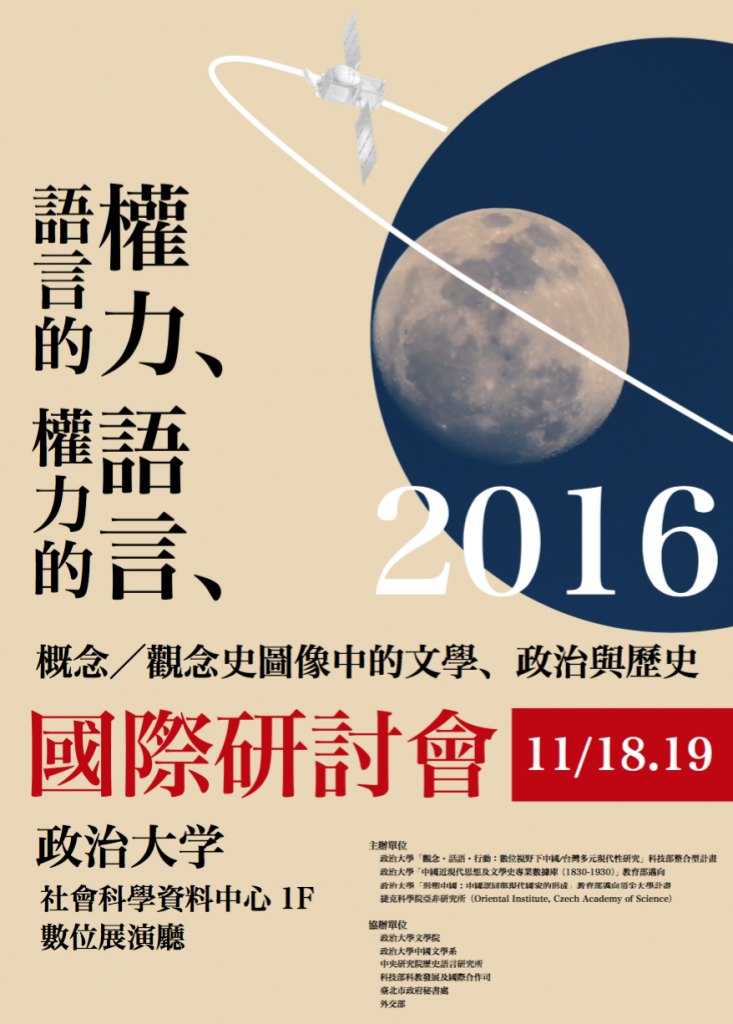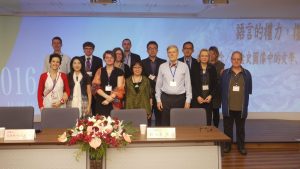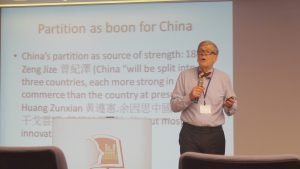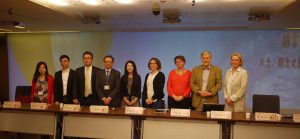
Conference: Power of Language, Language of Power–Where Conceptual History Meets Literary and Political History
17/11/2016 Tana Dluhosova Events, News, TaiwanThe international conference Power of Language, Language of Power: Where Conceptual History Meets Literary and Political History jointly organised by our Centre and Department of Chinese Literature (National Chengchi University), which will take place on November 18-19, 2016, at National Chengchi University.
Description:
This workshop is designed to address a seeming opposition between language and reality, political discourse and political practice. Whilst it has been widely recognized that discourse on politics and political action are inextricably intertwined, the complex relationship between these two overlapping and mutually interacting areas remains difficult to define, to comprehend, and to operationalize in the form of actual research projects. The workshop is intended to address the interplay between language and politics on the basis of case studies as well as theoretical and methodological reflections about politics and political discourse in modern and contemporary China with regard to power, broadly understood.
Given the richness and multifaceted nature of political discourse in this period, we would like to tap into a number of theoretical and methodological resources which can potentially illuminate each other, reaching from conceptual and intellectual history over discourse analysis and literary criticism to social and political history. We invite participants to contribute by drawing on a broad array of sources such as official documents and publications, essayistic writing and literature, opinion pieces and newspaper reports, but also on private materials such as letters and diaries in order to develop a comprehensive vision of the scope of the question.
We kindly ask participants in their papers to address questions such as the ones summarized under the following three headings.
Term, concepts, actors
- What are the key terms in political discourses or ideologically loaded writings in modern Chinese and Taiwanese history?
- What do these terms mean and how do we find out about their meaning? What are their implications in a given context? How does the vocabulary of participants in political debate (politicians as well as writers) differ?
- How did participants in political debate adapt their messages to different audiences, depending, for instance, on social background, economic status, or political affiliation and sympathies?
- Does it lead to useful results if one relates investigations into the social background of actors in politics and participants in public debates to their political statements? That is, are their identifiable correlations between shared social background and political outlook?
- How and under which conditions do these concepts vary in the changing context of modern Chinese and Taiwanese history?
Literature, politics, power
- What is the mutual relationship between literature, political discourse and political decision-making processes as well we the implementation of their results? How (if at all) do intellectual debates and literary discourse feed into political decision-making processes?
- Do different conceptualizations of power and power relationships (e.g., in the form of different metaphors) influence political decision makers? (This may be a question that can best be analyzed on the basis of non-official or non-public sources, e.g., letters, diaries, minutes of meetings.)
- What is the relationship between political journalism and official language? Do they influence each other, and if so, how? Is it possible, in a given instance, to identify which side sets the agenda and which side responds?
- What effects does censorship have on political debate? Do participants in political discourse find ways to express themselves despite restrictions on free speech? What impact does censorship have on members of the public in terms of their political views but also with regard to how they express these views?
- What are the limits of language and where does its power end? For instance, how effective are persuasion and propaganda? What is the force of arguments to convince on a rational level, if such a level of pure rationality can be identified? What is the relationship between language and non-linguistic factors such as institutions, economic forces, and social structures?
Language, politics, and historical investigation
- Different approaches have been suggested for analyzing the relationship between language and politics: to study the relationship between crucial political concepts through an investigation into key vocabulary onomasiologically and semasiologically (conceptual history); to conceive of contributions to political debate as speech acts intended to achieve identifiable ends within a given historical context (Skinner); to regard political discourse as being constrained by contemporaneous conventions, the rules of the “language” of politics current at a given time (Pocock). Are these approaches mutually exclusive, or can they be fruitfully combined and put into a dialogic relationship with each other?
- What place should conceptual history and intellectual history assume within the larger framework of historical investigation, that is, how do they contribute to the larger question of how to the writing and understanding of history in general?
[/accordion-item][/accordion]
Program:
| November 18, 2016 (Friday)
Digital Exhibition Hall, Social Sciences Information Center (ground floor), National Chengchi University |
||||
| 9:00–9:30 | Registration | |||
| Opening Ceremony | ||||
| 9:30–9:40 | Lin Chi-ping 林啟屏 Dean of the College of Liberal Arts and Professor at the Department of Chinese LiteratureTáňa Dluhošová Research Fellow, Oriental Institute of the Czech Academy of Sciences
|
|||
| Keynote Speech
Chair and Discussant: Joyce C. H. Liu 劉紀蕙 |
||||
| 9:40–10:50 | Rudolf G. Wagner Senior Professor of Chinese Studies, Director of the Cluster of Excellence “Asia and Europe in a Global Context: The Dynamics of Transculturality,” Heidelberg University ‘Dividing up the Chinese Melon’: Transcultural Metaphor in the Formation of National Myth
|
|||
| 10:50–11:10 | Tea Break
|
|||
| Language Politics and Decolonization of Thought
Chair and Discussant: Rudolf G. Wagner |
||||
| 11:10–12:20
|
Wu Zhe 吳啟訥 Associate Research Fellow, Institute of Modern History, Academia Sinica |
與社會主義接軌──1950 年代新疆突厥語族文字拉丁化方案興廢背後的語言政治史 | ||
| Joyce C. H. Liu 劉紀蕙 Professor and Director, Graduate Institute for Social Research and Cultural Studies, National Chiao Tung University |
知識型的內部殖民與解殖:重探儒家的天人合一與自我創造性轉化 | |||
| 12:20–14:00 | Lunch | |||
| Conceptual Change and Cultural Mediation
Chair and Discussant: Huang Ko-wu 黃克武, Distinguished Research Fellow, Institute of Modern History, Academia Sinica |
||||
| 14:00–15:50 | Natascha Gentz Professor of Chinese Studies, University of Edinburgh |
Transnational negotiations of terms and concepts related to the idea of “Press Freedom” in Late Qing China | ||
| Shen Guo-Wei 沈國威 Professor at Department of Foreign Languages Studies & Research Fellow at the Institute of Oriental and Occidental Studies, Kansai University |
嚴復與「自由」 | |||
| Peter Zarrow Professor, Department of History, University of Connecticut & Research Fellow, Institute of Modern History, Academia Sinica |
Utopianism and Liberalism in Republican China: Chen Duxiu and Hu Shi | |||
| 15:50-16:20 |
Tea Break
|
|||
| Knowledge Flow and National Character
Chair and Discussant: tbc |
||||
| 16:20–17:30 | Leigh Jenco Lecturer in Political Theory, London School of Economics and Political Science |
Is there “Philosophy” Outside the West? –The “Legitimacy of Chinese Philosophy” Debate and the Global Extension of Disciplinary Knowledge
|
||
| Jiří Hudeček Research Fellow & Assistant Professor, Institute of Far Eastern Studies, Charles University |
Mathematics and National Character in 1930s China | |||
| November 19, 2016 (Saturday)
Digital Exhibition Hall, Social Sciences Information Center (ground floor), National Chengchi University |
||||
| 9:00–9:30 | Registration | |||
| Keynote Speech
Chair and Discussant: Lin Chi-ping 林啟屏 Dean of the College of Liberal Arts and Professor at the Department of Chinese Literature |
||||
| 09:30–10:40 | Presenter:
Carl K.Y. Shaw 蕭高彥
思想史研究中的概念、語言,以及語言運用
|
|||
| 10:40–11:00 | Tea Break | |||
| Political Rhetoric and Ideology
Chair and Discussant: Peter Zarrow, Professor, Department of History, University of Connecticut & Research Fellow, Institute of Modern History, Academia Sinica |
||||
| 11:00–12:10 |
Táňa Dluhošová |
Trajectories of Ideas: Mainland Chinese Intellectuals in Taiwan and Their Writings Before and After World War II. | ||
| Ondřej Klimeš Research Fellow, Oriental Institute of the Czech Academy of Sciences |
Creating Authoritarian Ideational Order in Sheng Shicai’s Xinjiang: A Case Study of the New Life | |||
| 12:10–13:30 | Lunch | |||
| Concepts and Metaphors
Discussant and Chair:Eugene W. Chiu 丘為君, Professor, Department of History , Tunghai University |
||||
| 13:30–14:40 | Song In-jae 宋寅在 Professor, Hallym Academy of Sciences, Hallym University |
人權、知識人、政治 | ||
| Chiu Wei-Yun 邱偉雲 Assistant Professor, Hubei University of Economics, Department of Chinese Literature |
觀念的鬥爭:論中國近代平等論述中政治修辭與隱喻結構的多重展演 | |||
| 14:40–15:00 | Tea Break | |||
| Literary Space and the Politics of Representation
Chair and Discussant: Chen Fang-ming 陳芳明, Professor, Graduate Institute of Taiwanese Literature, National Chengchi University |
||||
| 15:00–16:40 | Cheng Wen-hui 鄭文惠
Professor, Department of Chinese Literature, National Chengchi University |
身體政治與話語權力:周瘦鵑社會諷喻小説的日常現代性 | ||
| Huang Mei-e 黃美娥 Professor and Director,, Graduate Institute of Taiwanese Literature, National Taiwan University |
認識敵人的方法:林適存《紅朝魔影》的歷史敘事與文學政治 | |||
| Chan Kwok Kou Leonard 陳國球 Dean of the Faculty of Humanities and Professor of Chinese literature, The Education University of Hong Kong |
文學批評的文化政治 | |||
| 16:40–16:50 | Break | |||
| Roundtable Discussion
Landscapes of Conceptual History –Intersection of Concepts, Politics, and History
Chairs: Táňa Dluhošová |
||||
| 16:50–18:00 | Rudolf G. Wagner Senior Professor of Chinese Studies, Director of the Cluster of Excellence “Asia and Europe in a Global Context: The Dynamics of Transculturality,” Heidelberg UniversityNatascha Gentz Professor of Chinese Studies, University of Edinburgh Shen Guo-Wei 沈國威 Song In-jae 宋寅在 Leigh Jenco Chan Kwok Kou Leonard 陳國球 Huang Mei-e 黃美娥 |
|||
| 18:00–18:10 | Closing Ceremony
Rudolf G. Wagner Cheng Wen-hui 鄭文惠 Táňa Dluhošová |
|||
- Opening Ceremony
- Prof. Rudolf Wagner, keynote speaker
- Roundtable
Photo: Vladimír Liščák
backwards



